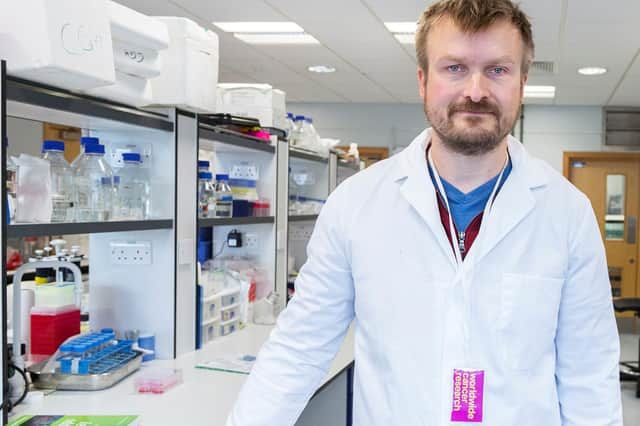Groundbreaking research into lung cancer caused by asbestos needs to recommence scientist says


Dr Carsten Hansen who is based at the Centre for Inflammation Research at the University of Edinburgh, and his team have recently returned to their work analysing the distinct mechanisms that cause Malignant Pleural Mesothelioma (MPM).
Currently there is no treatment for pleural mesothelioma which occurs after exposure to asbestos and has a prolonged latency period - typically around 30 years.
Advertisement
Hide AdAdvertisement
Hide AdMPM is characterised by its aggressiveness and high degree of tumour infiltration, which makes it difficult to dissect.
Around 200 people in Scotland are diagnosed with mesothelioma each year and there are around 170 deaths.
Dr Hansen said the the impact of lockdown meant they were forced to terminate some longer-term experiments and urgently needed to freeze cells for storage.
He said: “Although we took great care in safe guarding our experiments and newly generated cellular model systems, unfortunately the timing of the complete lockdown meant that we lost a few critical cell lines that we now need to re-establish.
"Experimental wise we managed to submit samples for large-scale analysis just before lockdown, which meant that we could analyse these data in-depth
while working from home.
“Overall, I am impressed how my team came together and worked through these challenging times.”
Dr Hansen and his team received almost £195,000 in funding for their three-year research project from Edinburgh-based Worldwide Cancer Researchwho are Scotland’s only cancer charity which funds new research into any type of cancer and have invested £200m globally.
He said: “I am worried that there will be less funding available, especially for discovery sciences, such as the type of research we carry out.
“This initial discovery, or the “first step” is essential.
Advertisement
Hide AdAdvertisement
Hide Ad“I am concerned that projects that could lead to new future transformative cancer treatments will not be initiated.
“It is important to highlight that different scientists have been impacted differently by the lockdown.
“Wet lab scientists that need a laboratory to carry out their research have clearly suffered the most, whereas computer-based scientists have been less impacted. It is likewise important to highlight that scientist with caring responsibilities and/or health issues have faced further challenges.
He added: “This is unfortunately and unfairly likely to have a lasting impact on people’s careers.
“It is very important to take this into account going forward especially considering that a large part of the workforce and the graduate student population are on short-term, 2-4-year contracts or stipends.
“Providing further support to these scientists, at this critical career stage is crucial, so we don’t risk losing a generation of scientist.”
Scotland has a long and unique history with asbestos which occurs naturally and is still found in some older schools and hospitals.
Many of the shipbuilding community that existed in Clydebank were exposed to the substance thus earning the town the unwanted moniker of the UK’s asbestos capital.
Advertisement
Hide AdAdvertisement
Hide AdLaura McLachlan, Director of Marketing and Fundraising at Worldwide Cancer Research, said: “When the pandemic hit in March, we were gearing up for our biggest year of fundraising to date.
“We relaunched the charity in 2019 having identified the scale of the funding gap in cancer research and started 2020 with one clear focus – to fund more new cancer research.
"Our plan is to more than double the level of research grants we fund every year by 2030.
"Given that we receive no government funding, the only way we can achieve this goal is through the power of people and fundraising.
"Their kindness and ingenuity in coming up with great new fundraising ideas is vital.
"However, since March, much of our fundraising has stopped – none of our fundraising events got off the ground in 2020 and our big campaigns had to pause.
"The full extent of how the pandemic has impacted the sector in the long-term remains to be seen, but we are hopeful that the money raised by our amazing supporters in recent months will allow us to fund at least some new projects at our Bold Ideas Gathering in October.”
A message from the Editor:
Thank you for reading this story on our website. While I have your attention, I also have an important request to make of you.
Advertisement
Hide AdAdvertisement
Hide AdThe dramatic events of 2020 are having a major impact on many of our advertisers - and consequently the revenue we receive. We are now more reliant than ever on you taking out a digital subscription to support our journalism.
Subscribe to scotsman.com and enjoy unlimited access to Scottish news and information online and on our app. Visit https://www.scotsman.com/subscriptions now to sign up.
By supporting us, we are able to support you in providing trusted, fact-checked content for this website.
Joy Yates
Editorial Director
Comments
Want to join the conversation? Please or to comment on this article.